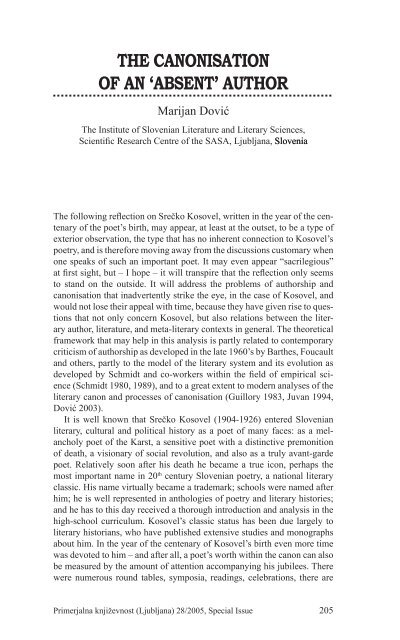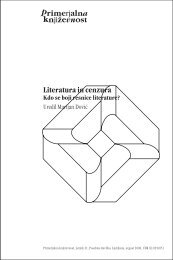- Page 3 and 4:
Ljubljana 2005 ● Posebna števil
- Page 5:
Avgust Černigoj: Srečko Kosovel (
- Page 8 and 9:
VSEBINBoris A. Novak:kosovel, velik
- Page 10 and 11:
niških parazvrsti sledijo prispevk
- Page 12 and 13:
KOSOVELOVA POETIKASredi dehtečih b
- Page 14 and 15:
KOSOVELOVA POETIKADaj mi, Bog, da m
- Page 16 and 17:
KOSOVELOVA POETIKAneoporečen, si K
- Page 18 and 19:
KOSOVELOVA POETIKAKadar bolna duša
- Page 20 and 21:
KOSOVELOVA POETIKAje pri vprašanji
- Page 23 and 24:
KOSOVEL IN MODERNA POEZIJA:ANALIZA
- Page 25 and 26:
DARJA PAVLIČ: KOSOVEL IN MODERNA P
- Page 27 and 28:
DARJA PAVLIČ: KOSOVEL IN MODERNA P
- Page 29 and 30:
DARJA PAVLIČ: KOSOVEL IN MODERNA P
- Page 31 and 32:
DARJA PAVLIČ: KOSOVEL IN MODERNA P
- Page 33 and 34:
DARJA PAVLIČ: KOSOVEL IN MODERNA P
- Page 35 and 36:
DARJA PAVLIČ: KOSOVEL IN MODERNA P
- Page 37 and 38:
DARJA PAVLIČ: KOSOVEL IN MODERNA P
- Page 39 and 40:
Ideja integralovv Kosovelovi poezij
- Page 41 and 42:
Bożena Tokarz: Ideja integralov v
- Page 43 and 44:
Bożena Tokarz: Ideja integralov v
- Page 45 and 46:
tost besedne umetnosti. Ko je opazi
- Page 47:
Bożena Tokarz: Ideja integralov v
- Page 50 and 51:
KOSOVELOVA POETIKAdodeljena štipen
- Page 52 and 53:
KOSOVELOVA POETIKAki ji bo pripadal
- Page 54 and 55:
KOSOVELOVA POETIKAZa LCK je bil zna
- Page 56 and 57:
KOSOVELOVA POETIKAv katerem sta bil
- Page 58 and 59:
KOSOVELOVA POETIKAČe k temu dodamo
- Page 60 and 61:
KOSOVEL’s poeticsznamenitih konso
- Page 62 and 63:
KOSOVELOVA POETIKAsam uspel spravit
- Page 64 and 65:
KOSOVELOVA POETIKAkaže njegovo pre
- Page 66 and 67:
KOSOVELOVA POETIKAsama na sebi prob
- Page 68 and 69:
KOSOVELOVA POETIKAdestrukcije vseh
- Page 70 and 71:
KOSOVELOVA POETIKAra - ta je lahko
- Page 72 and 73:
KOSOVELOVA POETIKA6To se, resnici n
- Page 74 and 75:
KOSOVELOVA POETIKAAnton OCVIRK, 194
- Page 77 and 78:
Kanonizacija»odsotnega« avtorjaMa
- Page 79 and 80:
Marijan Dović: Kanonizacija »odso
- Page 81 and 82:
Marijan Dović: Kanonizacija »odso
- Page 83 and 84:
Marijan Dović: Kanonizacija »odso
- Page 85 and 86:
KOSOVEL IN NIHILIZEM:POSKUSKONSTRUK
- Page 87 and 88:
MATEVŽ KOS: KOSOVEL IN NIHILIZEM:
- Page 89 and 90:
MATEVŽ KOS: KOSOVEL IN NIHILIZEM:
- Page 91 and 92:
MATEVŽ KOS: KOSOVEL IN NIHILIZEM:
- Page 93:
MATEVŽ KOS: KOSOVEL IN NIHILIZEM:
- Page 96 and 97:
KOSOVELOVA POETIKAgovoriti obširno
- Page 98 and 99:
KOSOVELOVA POETIKA1993). Italijansk
- Page 100 and 101:
KOSOVELOVA POETIKAZlati čoln v mo
- Page 102 and 103:
KOSOVELOVA POETIKAdružbi, vendar s
- Page 104 and 105:
KOSOVELOVA POETIKABIBLIOGRAFIJAADOR
- Page 106 and 107:
KOSOVELOVA POETIKA• POVZETEKUDK 8
- Page 108 and 109:
KOSOVELOVA POETIKAFirencah, pridru
- Page 110 and 111:
KOSOVELOVA POETIKAnjegovi poetiki n
- Page 112 and 113:
KOSOVELOVA POETIKAumnih, z italiani
- Page 114 and 115:
KOSOVELOVA POETIKAOPOMBE1 Prim. E.
- Page 116 and 117:
KOSOVELOVA POETIKA20 Cit. v: B. Pah
- Page 118 and 119:
KOSOVELOVA POETIKAbili blizu. Podob
- Page 120 and 121:
KOSOVELOVA POETIKAKot je Kosovel ne
- Page 122 and 123:
KOSOVELOVA POETIKAselekciji gradiva
- Page 124 and 125:
KOSOVELOVA POETIKAtudi naslov druge
- Page 126 and 127:
KOSOVELOVA POETIKA4C. Rebora, Framm
- Page 128 and 129:
KOSOVELOVA POETIKA50Idem, str. 193.
- Page 130 and 131:
SODCIDarja Betocchi poučuje italij
- Page 132 and 133:
poetike. Napisala je več kot 100 r
- Page 134 and 135:
ContentsBoris A. Novak:kosovel, a g
- Page 136 and 137:
es are followed by papers discussin
- Page 138 and 139:
KOSOVEL’s poeticsSredi dehtečih
- Page 140 and 141:
KOSOVEL’s poeticsRather than repe
- Page 142 and 143:
KOSOVEL’s poeticsby an eight-line
- Page 144 and 145:
KOSOVEL’s poeticsKosovel’s comb
- Page 146 and 147:
KOSOVEL’s poeticsIn Kosovel’s s
- Page 148 and 149:
KOSOVEL’s poetics• AbstractUDK
- Page 150 and 151:
KOSOVEL’s poeticsthorn, gathered
- Page 152 and 153:
KOSOVEL’s poeticsthere is a techn
- Page 154 and 155:
KOSOVEL’s poeticsin the “Pains
- Page 156 and 157:
KOSOVEL’s poeticsof the setting s
- Page 158 and 159: KOSOVEL’s poeticsThe SunThere are
- Page 160 and 161: KOSOVEL’s poeticsserve Kosovel’
- Page 162 and 163: KOSOVEL’s poeticsImages of the pi
- Page 164 and 165: KOSOVEL’s poeticsbibliographyBALA
- Page 166 and 167: KOSOVEL’s poeticsbeing the piano
- Page 168 and 169: KOSOVEL’s poeticswhole, if not of
- Page 170 and 171: KOSOVEL’s poeticslacking in the L
- Page 172 and 173: KOSOVEL’s poeticsnot fail to noti
- Page 174 and 175: KOSOVEL’s poeticsKosovel’s shun
- Page 176 and 177: KOSOVEL’s poeticsmand creative pa
- Page 179 and 180: Srečko Kosoveland the European ava
- Page 181 and 182: Janez Vrečko: Srečko Kosovel and
- Page 183 and 184: Janez Vrečko: Srečko Kosovel and
- Page 185 and 186: Janez Vrečko: Srečko Kosovel and
- Page 187 and 188: Janez Vrečko: Srečko Kosovel and
- Page 189 and 190: Janez Vrečko: Srečko Kosovel and
- Page 191: • ABSTRactJanez Vrečko: Srečko
- Page 194 and 195: KOSOVEL’s poetics1967, 41 year af
- Page 196 and 197: KOSOVEL’s poeticsa sample avant-g
- Page 198 and 199: KOSOVEL’s poeticsThe Heterogeneit
- Page 200 and 201: KOSOVEL’s poeticsloyalty” - the
- Page 202 and 203: KOSOVEL’s poeticsThe subject in t
- Page 204 and 205: KOSOVEL’s poeticsNOTES1Matevž Ko
- Page 206 and 207: KOSOVEL’s poeticsGraham HOUGH: Th
- Page 210 and 211: KOSOVEL’s poeticsnew scientific s
- Page 212 and 213: KOSOVEL’s poeticsis not studied a
- Page 214 and 215: KOSOVEL’s poeticshad “held back
- Page 216 and 217: KOSOVEL’s poeticsMarijan Dović:
- Page 219 and 220: Kosovel and Nihilism:An Attemptat C
- Page 221 and 222: METVŽ KOS: Kosovel and Nihilism: A
- Page 223 and 224: METVŽ KOS: Kosovel and Nihilism: A
- Page 225 and 226: METVŽ KOS: Kosovel and Nihilism: A
- Page 227: METVŽ KOS: Kosovel and Nihilism: A
- Page 230 and 231: KOSOVEL’s poeticstimes the other
- Page 232 and 233: KOSOVEL’s poeticssubjectivity - i
- Page 234 and 235: KOSOVEL’s poeticsthe reader’s e
- Page 236 and 237: KOSOVEL’s poeticsespecially a poe
- Page 238 and 239: KOSOVEL’s poeticsMontage composit
- Page 240 and 241: KOSOVEL’s poetics6See Kosovel’s
- Page 242 and 243: KOSOVEL’s poeticsevaluate him-/he
- Page 244 and 245: KOSOVEL’s poeticsaffected by a cr
- Page 246 and 247: KOSOVEL’s poeticsBarni, written i
- Page 248 and 249: KOSOVEL’s poeticscontributed to i
- Page 250 and 251: KOSOVEL’s poeticsConstructivism l
- Page 252 and 253: KOSOVEL’s poeticsextent that, as
- Page 255 and 256: Analogies betweenS. Kosovel and C.
- Page 257 and 258: Darja Betocchi: Analogies between S
- Page 259 and 260:
Darja Betocchi: Analogies between S
- Page 261 and 262:
Darja Betocchi: Analogies between S
- Page 263 and 264:
Darja Betocchi: Analogies between S
- Page 265 and 266:
Darja Betocchi: Analogies between S
- Page 267 and 268:
Nietzschejem: Nietzsche in ničejan
- Page 269 and 270:
Comparative Literature, Volume 28,
















